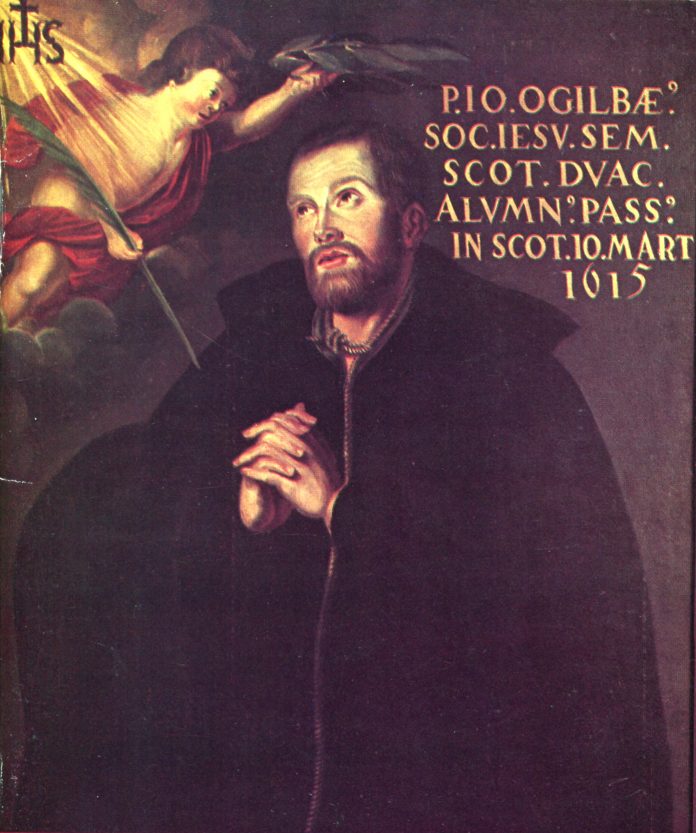Due to some technical and other issues, we’re a day late on re-posting this piece, , on the last martyr of the ‘Reformation’ – a term which I generally put in scare quotations, for the real reformation was the also-inaptly-named Catholic ‘Counter-Reformation’, led by the Society of Jesus, when they were all fresh and sound; now, like produce in the grocery store, one has to ‘feel them out’ first. But I digress, for today’s saint was indeed a Jesuit, a staunch and fearless one, as so many were and have been throughout history. Editor.
John Ogilvie, born in 1579, was raised in his first formative years by a Calvinist father in post-Reformation Scotland, but, as with many young noblemen, he was sent to the Continent to be educated by the recently-founded Jesuits, who had already made a name for themselves for having the best schools and curricula (adopting what had always been considered a Catholic liberal arts program).
Young Sir John soon realized the truth of Catholicism, in contrast to the obvious errors, theological, historical and spiritual, of the renegade-priest John Knox’s Presbyterianism, and, at the age of 17, was received into the Church. Soon afterwards, he joined the Jesuits themselves in 1599, and, after a solid formation, was ordained in 1610.
Father Ogilvie spent his all-too brief priestly ministry as a missionary first in London, then Paris, and finally in his native Scotland, where Catholicism and the sacraments were outlawed under pain of death; it was here, not far from where he was born, after working for a year clandestinely as a priest under the pseudonym ‘John Watson, horse-trader’ that he was betrayed.
His virtue and discipline shone forth during his brutal imprisonment, and his patience and kindness converted many. The King’s Men strove to coerce him to betray his confidants, renounce his faith, and swear allegiance to King James (the Sixth of Scotland, and the First of England, the tragic Protestant son of the tragic Catholic Mary, Queen of Scots, put to death when James was but an infant by the also-tragic Elizabeth the First).
Father Ogilvie underwent a number of tortures, being put in the ‘boots’, which crushed his feet, and the jailers were ordered to keep him awake for a full ‘novena’, nine days without sleep, towards the end of which they had to slash him with knives and drop him on the floor to keep him awake. Physicians who examined him afterward declared that one more day would have killed him, and the priest was never the same afterward; as he confessed, his sharp mind was now somewhat confused.
During all of this inhuman treatment, Father Ogilvie remained steadfast; the rumour that he ‘gave away names’ (repeated on Wikipedia) is at the very least debatable, and what he said during sleep deprivation was not under the sway of reason. Throughout it all, Father Ogilvie refused to submit to the King or his heretical faith, declaring that the King was playing ‘runagate from God’, and that he would no more recognize him in his spiritual authority than an ‘old hat’.
Ogilvie was condemned to the brutal death of being ‘hung, drawn and quartered’, a sentence carried out on this day, March 10, 1615, ten years before another Jesuit by the name of John, de Brebeuf, was sent on his own missionary work to New France, where he would meet a similar fate.
As Father Ogilvie ascended the scaffold at Glasgow Cross (where a monument to the saint now stands), the priest embraced the hangman, urging him to ‘be of good cheer’, confessing before the expectant crowd,
“In every duty which I owe the King’s majesty I will show myself a most obedient subject; for if any invade his temporal rights I would shed my last drop of blood in his defence”
Like Thomas More a century before and four hundred miles south, Ogilvie died the King’s good servant, but God’s first.
Father John Ogilvie was canonized in 1976, becoming the last post-Reformation Scottish saint (so far!). As Cardinal John Henry Newman was to predict two centuries afterward, no country can keep its Christian identity without being fully Catholic, for Protestantism, having no locus of authority and cohesion, eventually fragments into agnosticism and secularism, in which Scotland, the rest of the ‘United Kingdom’, and all of Europe, come to think of it, are now all immersed.
We pray for the return of the faith to that beautiful and bonnie land, the land of my own birth, once so Catholic. The blood of martyrs is the seed of faith, which, like the nation itself, may yet rise again, some way, or another.
Saint John Ogilvie, ora pro nobis!











